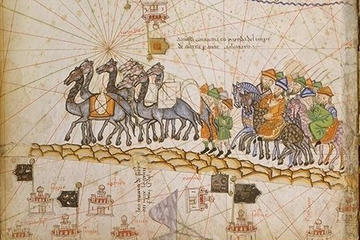
By Cresques Abraham (Atlas catalan) [Public domain], via Wikimedia Commons
Global History in Oxford is defined broadly as the global movement of people, goods, and ideas, and the consequences that flow from this movement. Chronologically, it extends across all historical periods from Ancient to Late Modern. Through workshops, networks, conferences, and publications, the Centre provides a history of the world which both decentres and includes Europe, encouraging cooperation between historians of different periods and places.
We rigorously engage with histories of empires and the problematic legacies of colonialism both in Britain and elsewhere in the world, hosting a range of research and courses that critically assess the historical nature and ongoing impact of empires and decolonisation.
The Centre has particular strengths in Religion, Conflict, Science, Gender, Ecology, Capitalism, Empires, and Migration. Go to Projects page..
These build on Oxford’s rich resources in global history. The Bodleian’s Commonwealth and African collection is housed in the Weston Library and contains exceptional resources in books and manuscripts in African and imperial history. The Oriental Institute Library houses the former Indian Institute collections, and is a dedicated resource for South Asian, Islamic, and Jewish Studies. The Middle East Centre has an extensive collection of private papers. The China Centre serves Chinese history, and the Nissan Institute, Japanese history. The University is particularly rich in materials for the study of British imperial history and the history of the European continent, including Russia, while the Rothermere American Institute provides a specialized library in U.S. history.
The University of Oxford is home to world-renowned museums and their unparalleled global collections, including the Ashmolean, the Museum for the History of Science, and the Pitt Rivers Museum.